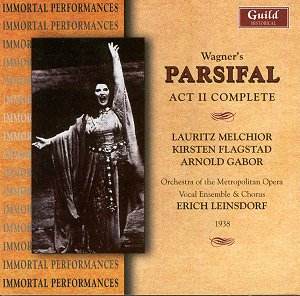Legal complications have meant that Guild has now taken
over from Naxos in the valuable undertaking of producing and issuing
not only the NBC Toscanini concerts series but also the substantial
array of Met broadcasts of 1938-44. It should first be noted that this
Parsifal in its entirety was issued on Myto some years ago but that
source material was derived from acetate discs which meant side breaks
every seven minutes or so. Guild’s source is different and in significantly
better sound and is not subject to the somewhat ruinous dislocations
that invariably marred the earlier release – and in addition has been
judiciously equalized, retaining necessary frequencies whilst also including
inevitable surface noise. Richard Caniell’s notes set the scene.
This is the only surviving example of Flagstad and
Melchior on stage – in this annual Met Parsifal (they were to leave
studio performances of course) – but we are especially fortunate in
its preservation because there were no further Parsifal broadcasts until
1952. The recording was made by a New York dubbing service for a university
professor who preserved Act II only. Pressings were sixteen 12"
aluminium discs and have survived in a generally excellent state of
preservation – there is some groove wear, occasionally troublesome,
and some ticks, seldom intrusive; a few seconds of patching from Flagstad’s
commercial recording has proved necessary because of a clipped chord
at one point in the disc changeover. It needs to be stressed however
that the Act has been captured with far better than anticipated clarity
and presence and those who know the performance from the Myto issue
– or who may have heard Edward J Smith’s private LP pressing – will
need this new incarnation.
Leinsdorf conducted Act II whilst Bodansky took the
outer Acts. A certain amount of confusion has surrounded this arrangement,
some writers even going so far as to say that Bodansky, who died the
following year, suffered a mild heart attack after Act I but recovered
sufficiently to take over Act III from Leinsdorf which seems highly
improbable, even given the rejuvenatory powers of Wagnerian conducting.
What is far more likely is that Leinsdorf, who had been assigned the
earlier Parsifal performance on April 13th because the ailing
Bodansky’s doctors had advised him to rest, was in attendance on the
18th to split the burden with the veteran conductor. Bodansky
was notorious for his cuts and for his energetic tempi and Leinsdorf
is certainly nothing if not passionate. His tempi are inclined to the
tumultuous, surging forward, intent on external drama rather at the
expense of internal growth. In Met stalwart Arnold Gabor he had a Klingsor
of unspectacular but highly musicianly stature; seldom emoting or caricaturing.
Flagstad’s entrances in this Act are of feminine ease, lacking the declamatory
fervour most often to be associated with her. Here she is elegant and
seductive, her range even and controlled, her impersonation of Kundry
complete in the minutest verbal detail. Melchior is in magnificent voice,
strident, urgent, pensive, alive to the unfathomable twists of his encounter
with Kundry, commandingly flexible. As a pendant there is a fourteen-minute
excerpt from a later production with an ungainly splice from one of
Melchior’s commercial discs as noted above. Guild will release the excerpt
in its entirety in their release devoted to Herbert Janssen. I wish
Guild had given us the names of the Flower maidens. As for the performance
it’s a unique recorded event in sound better than it has ever received.
Jonathan Woolf
See also reviews
by Chris Fifield and Robert Farr


